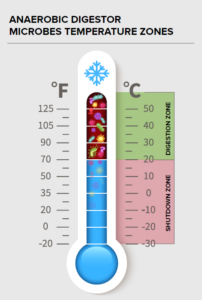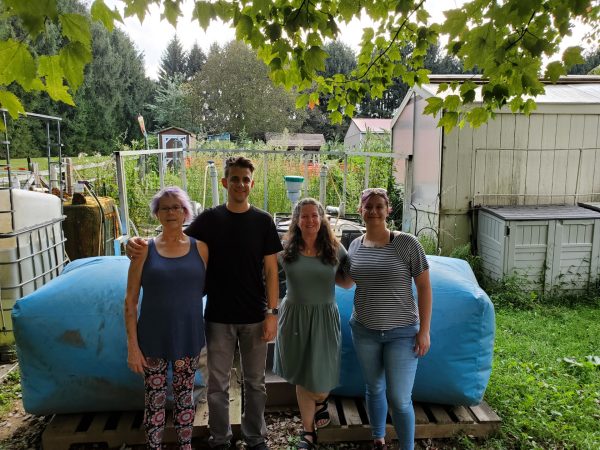Anaerobic Digestors Shutdown Zone, Addressing The Thermal Challenge
What is Anaerobic Digestion?
Anaerobic Digestion (AD) is the process through which colonies of bacteria (acetogens) and methane-forming archaea (methanogens) digest organic waste, producing two valuable byproducts:
- Natural biogas in the form of methane
- Nutrient-dense effluent or well processed organic waste that can be used as an upgraded fertilizer
 Much like the flora in our guts, these colonies work best in elevated temperatures.
Much like the flora in our guts, these colonies work best in elevated temperatures.
Microscale or homestead scale Anaerobic Digester (AD) systems currently struggle in cold-weather climates. The digester technology does not function below 20°C because the micro-organisms are not able to survive colder temperatures. Without adequate heating, they see shut-down in the winter months, and therefore, organic waste cannot be processed. This makes the technology more common in locations that see warmer temperatures year-round. However, this technology could benefit all communities as it wrings out the last vestiges of solar energy that are naturally stored in organic waste.
How is an Anaerobic Digestor used?
Wherever farm animals are raised, a Manure Management Plan is required. Anaerobic Digestion (AD) can be adapted into most waste management plans as required by all US commercial farms and homestead farms. In addition to treating organic wastes, AD produces usable byproducts. The natural biogas produced is comprised of mostly methane and can be a replacement for fracked natural gas. The effluent, now a nearly clear liquid, is nutrient-dense.
These products can be used for many purposes such as:
- Heating
- Lighting
- Cooking
- Fertilizing
ACT has partnered with Solar CITIES, a Pennsylvania local non-profit educational charity that focuses on delivering biogas solutions globally through their biogas education program. Through a USDA Phase I SBIR program, ACT is addressing the thermal issues of micro-scale and homestead-scale Anaerobic Digestors in climates that see ambient temperatures below 20°C. One of the goals of this program is to reduce costs and increase the performance of Anaerobic Digestors to make the technology more attractive to small and mid-sized farms. This 6-month program will see the construction of an upgraded Anaerobic Digestor (AD) system with integrated, passive thermal control. This prototype system will be run and tested on the Solar CITIES proving grounds in Glenmoore, Pennsylvania.


